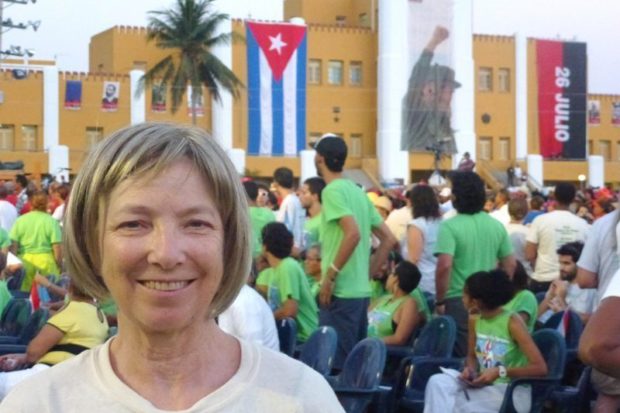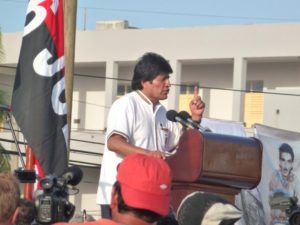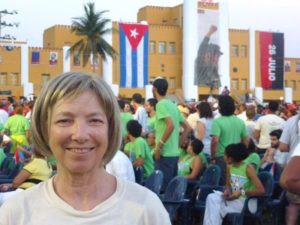
By Leni Reeves

The Cuban Revolution started 60 years ago, and it was a hard start. In fact, nothing afterward has been easy either. Blockaded and attacked by the most powerful empire in human history (yep, us), Cuba has endured and has been an example increasingly respected in the world and followed in Latin America and the Caribbean. At the most recent celebration of the revolution’s beginning, the heads of state of many Latin American and Caribbean nations went to Santiago de Cuba and spoke in front of the Moncada, formerly army barracks, now a museum and school complex.
Presidents and prime ministers thought this was an important occasion: Evo Morales of Bolivia, Daniel Ortega of Nicaragua, Jose Mujica of Uruguay, Nicolas Maduro of Venezuela, Roosevelt Skerrit of Dominica, Winston Baldwin-Spencer of Antigua and Barbuda, Kenny Davis Anthony of Santa Lucia, Ralph Gonsalves of St. Vincent and the Grenadines. A lot was said, but certain themes recurred: “Cuba gave dignity to the people of Latin America” and “Cuba taught us not to be afraid.”
What Event Were We Celebrating?
After years of organizing against tyranny and for better government, on July 26, 1953, 158 men and two women led by Fidel Castro and Abel Santamaria attacked the Moncada army barracks in Santiago de Cuba. Some were killed in battle; many were captured, tortured and killed. Some survived, including Castro. As a military operation, it failed; there were logistical errors and mishaps, as well as an overwhelming disparity in numbers and arms. But Moncada wasn’t only a military action; it was a political action and an organizing action, and it was not a failure in those terms. As we all know, five and a half years later the revolution triumphed.
Why Is This Important?
OK, so an island nation of a few million people threw off a repressive government. What is it about this change that has made Cuba an inspiration, a guiding light in the world from one point of view, and from the opposite point of view a country that must be forbidden to trade with and which you as a U.S. citizen are forbidden to go see?
The United States had always assumed that it had the absolute right to decide everything that happened in the Western Hemisphere. This didn’t leave much independence or dignity for those whose lives and countries we were controlling. Attempts at defiance or autonomy were quickly punished, by direct military force if required.
Cuba has not only held out, it has promoted the international nature of revolution. Cuban volunteers in Angola fought the forces of apartheid South Africa and defeated them. Cuban doctors are spread throughout Latin America and the Caribbean. Morales said, “The Cuban revolution is the mother of all the revolutions of America and of the world,” and he remembered that when he planned land reform which he feared would cause U.S. retaliation, Castro had said, “Evo, you are not alone.”

The other big inspiration, or problem depending on your perspective, is that Cuba has tried to find a working alternative to corporate capitalism and the relationships among people that it produces. There is no laboratory for social and economic changes, and they are not quick or foolproof or easy. The experiments have to happen among living people; some things go right and others don’t.
Enough has gone right to make the Cuban example threatening to those who want corporate capitalism to occupy the whole world. Cuba has tried to be a revolution of, by and for the “humildes,” the ordinary people (I’m quoting Raul Castro here, who also spoke). It has tried to be a revolution of dignity and self-worth and respect for diversity, of basic equality, of the weak not fearing that they will be crushed by the strong (quoting Jose Mujica, president of Uruguay). This alternative way is either profoundly inspiring or really scary, depending on your outlook.
I was proud to be present at the celebration of the 60th anniversary of the start of the Cuban Revolution.
*****
Leni Reeves is a local physician and activist. Contact her at lenivreeves@gmail.com.
